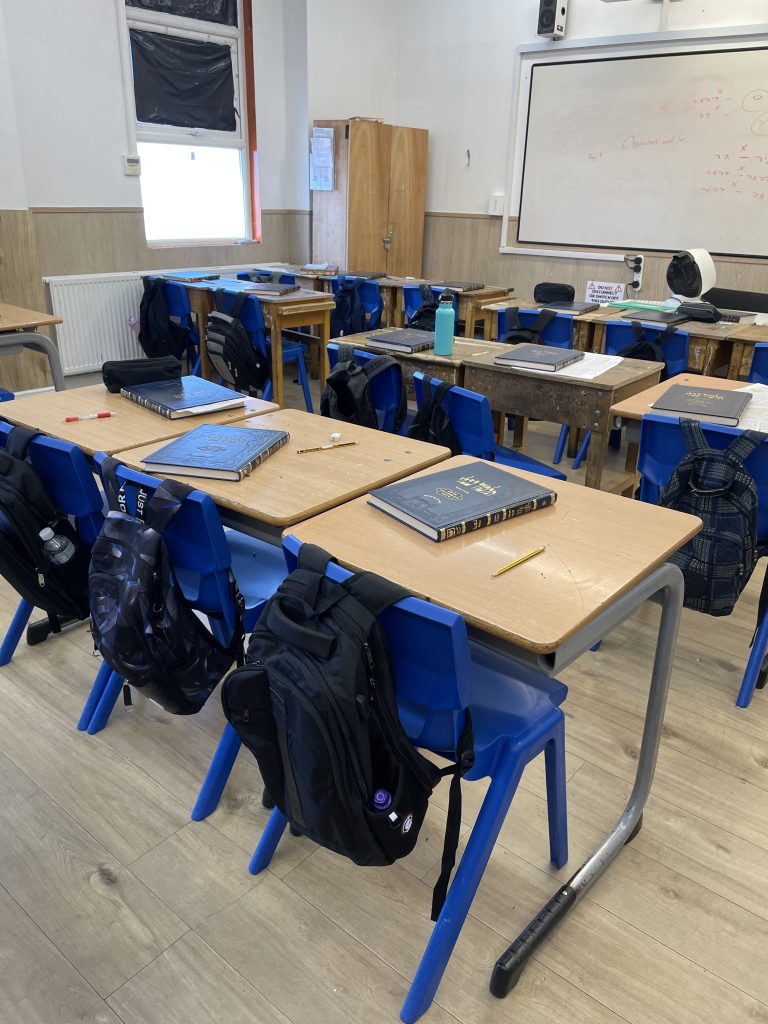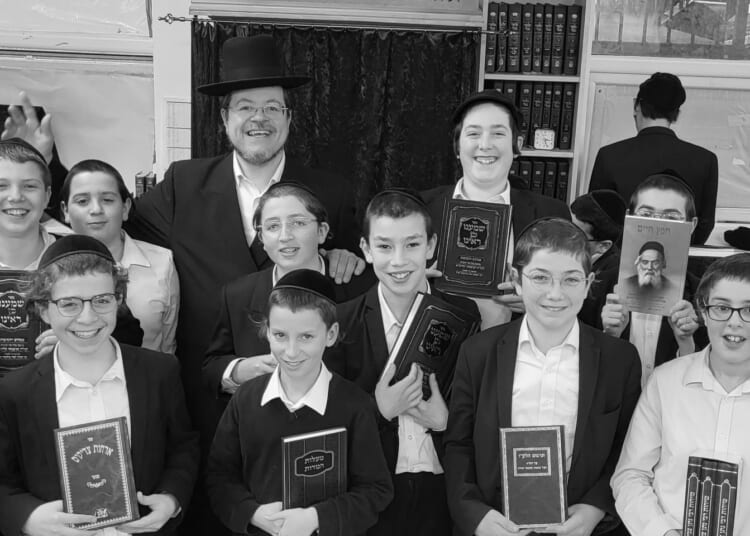Britain’s ultra Orthodox Haredi community is facing an existential crisis and threat. TCW writer Karen Harradine believes it to be serious and urgent, and one that cannot be overstated. In Parts I (here) and 2 (here) of this series she explains the damaging impact that proposed government schools legislation would have on their independent faith-based yeshiva schools, destroying the ancient tradition of Torah education in this country.
THE government, mainstream media and Humanist UK have all at times vilified Haredi schools and yeshivas, as detailed in the first two parts of this series. They accuse the schools of churning out illiterate young adults unprepared for life in modern Britain. But what I saw and experienced at Beis Medrash Elyon School which I visited earlier this autumn doesn’t support this.
This is a registered, independent Haredi school for around 100 boys aged 11 to 15, with most going to yeshivas afterwards. Though my visit was confirmed only the day before, I was given complete access to all parts of the schools and to talk to whom I chose. All those I met there were friendly, confident and open, including the students. On arrival I saw that the school was protected by a high security fence and guard. At the security gate I was met by the head of religious studies, the affable Rabbi Zvi Lebovics, and a bunch of happy teenagers, excited because they had just found out that a prominent rabbi was in town and that they were going to be able to hear him talk.
Prior to the interview Rabbi Lebovics had agreed to give me, I was taken on a thorough tour of the school by the deputy headteacher, Mark Garfield. What I saw was in total contrast to a lazy perception that’s been propagated by the mainstream media that Haredi schools are dirty and unkempt. Neither were the students I met awkward or inarticulate; rather they were well-mannered and eloquent.
It’s a small building that contains several classrooms like this,

offices, a kitchen, an indoor football pitch, ping pong tables, and a synagogue.

The corridors were clean and calm, the classrooms air-conditioned and spotless, with books and satchels neatly arranged on front-facing desks.
I sat in on some of the secular lessons taught in English including maths – I took a short video which you can see here, and geography, which you can see here.
The boys were dressed in a clean Haredi uniform of black trousers and white shirts, with black yarmulkes. Some had their shirts untucked like typical teenagers but all were quiet, listening attentively to their teachers, all of whom are fully qualified.
The students are not exposed to the internet at home, and access at school is allowed only under the strict guidance of their teachers. I was able to take a short video of an IT lesson.
Their heroes are not the vacuous ‘celebrities’ of TikTok but revered rabbis, some of whose photos adorn the school walls. They are given laptops to work on while at school and take their GCSEs a year earlier than state schools, with some achieving better than the national grade of 4.7.
The class sizes as you can see are small and average around 22 pupils; the teachers are either Haredi or secular. All students are given responsibilities throughout the year to build their self-confidence and teach the importance of contributing to society. The school day starts at 9am with prayers and a 30-minute session with class teachers on character building and wellbeing. The rest of the morning is devoted to Talmudic learning, where conversational, linguistic and analytical skills are honed through discussing commentary by Judaic sages. The students are encouraged to play sport and eat their sandwiches during the numerous breaks. Secular lessons are taught in the afternoon. After finishing their lessons at 6pm, the boys go home to their families. Some of the more motivated older pupils spend the evenings enjoying further religious studies.
Students are taught to think about other people, and the wider society around them. Rabbi Lebovics explained that they are not exposed to anything that is compromising or which damages their spiritual growth. They learn that they should behave in such a way that brings pride to their family and community, and that they should strive to always be pleasant company, which given my experience at the school, they have certainly succeeded in. Students who struggle academically are given extra tuition. Troubled or rebellious children are treated with compassion, given a mentor they can confide in and sometimes a licensed therapist too. All are taught public speaking skills, perform in school plays that they write themselves, and go hiking with their teachers in the Brecon Beacons.
While I chatted with Rabbi Lebovics in his office, several boys came to speak to him. All sweetly greeted me while making eye contact and smiling. Despite the government’s faux concerns over the ability of Haredi children to function in ‘modern Britain’, these boys seem far more educated, mature and articulate than their state school peers. My interview with a charming year ten student called Moshe Halberstadt cemented this observation. I spoke to Moshe alone, without a teacher or parent present. He radiated happiness when speaking about how welcomed and cared for he feels at the school, and praised how the teachers make their lessons engaging.
Moshe’s favourite subjects are English and creative writing, and believes that he stands a better chance of being a good citizen in comparison to state school peers because of the quality of education he is receiving. Arguments between students are infrequent and parents are very respectful of the teachers.
This is a very different scenario from mainstream schools. The government insists that their method of education is far superior to the system favoured by Orthodox Jewry, a delusion both concerning and destructive. Given the evidence of the astonishing numbers of 11-year-olds entering state secondary school without even basic maths or English, a phenomenon that is not evident in the Haredi secondary schools, this is something that those in the education establishment who are so keen to bring these schools under Ofsted, might ponder.
To be continued.

